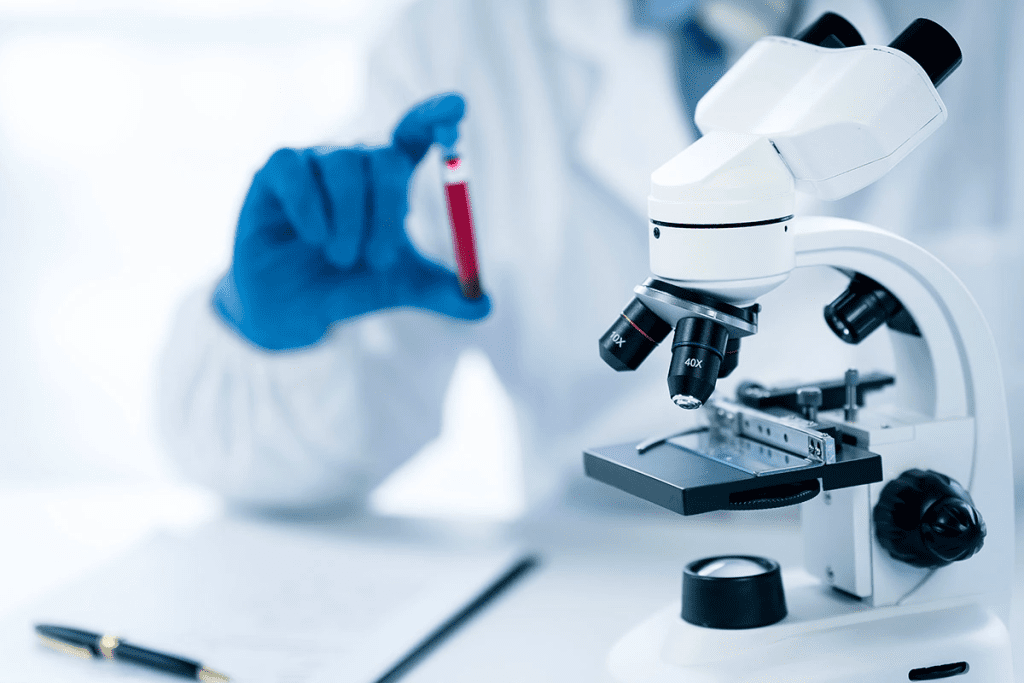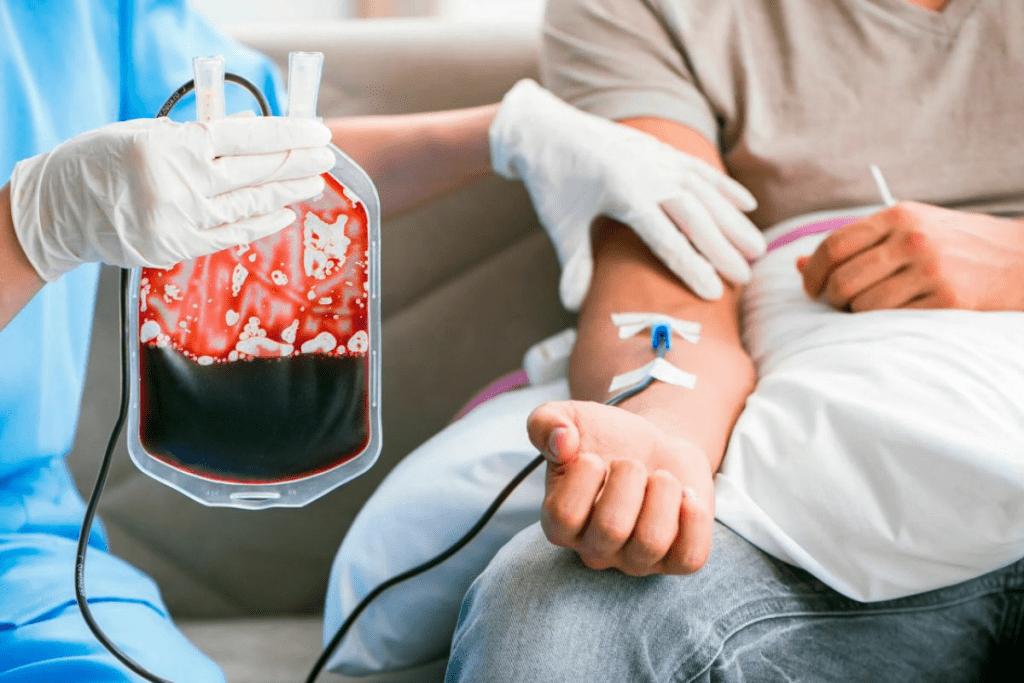Last Updated on November 14, 2025 by

A hematology appointment is often scheduled to diagnose or manage blood disorders. This includes anemia, leukemia, lymphoma, and clotting abnormalities. These conditions affect millions worldwide. A hematologist is a healthcare provider who specializes in diseases that affect your blood, bone marrow, and lymphatic system.
At LIV Hospital, we provide leading, ethical care for patients with blood-related conditions. A hematology appointment is typically scheduled when a primary care physician suspects a patient may have a blood disorder. Understanding what hematology is and its importance can help patients receive timely and appropriate care.

Blood disorders are a big health issue, affecting millions worldwide. As more people get older, these conditions will become even more common. Hematologists are key in finding and treating these problems.
Common blood conditions include anemia, leukemia, lymphoma, and clotting issues. These can really change someone’s life. For example, anemia can make you tired, weak, and short of breath. Leukemia and lymphoma can be serious if not treated right away.
In the U.S., about 2 million people will get cancer in 2025. Around 43% of oncologists focus on hematology oncology. This shows how vital hematologists are in fighting cancer.
The number of blood disorders is growing as people get older. Older folks are more likely to get diseases like myelodysplastic syndromes and multiple myeloma.
“The aging population is more prone to blood disorders, making it essential for hematologists to be equipped to handle these conditions.”
” Expert in Hematology

If your primary care doctor sends you to a hematologist, it’s usually because of unusual blood test results. A hematologist is a doctor who deals with blood and blood disorders. Knowing why you’re being referred can help you feel more ready for your visit.
Primary care doctors send patients to hematologists for many reasons. They might do this when they find something unusual in the blood. This could be abnormal blood counts, bleeding or clotting issues, or even blood cancers.
Experts say, “A primary care physician may refer a patient to a hematologist for any one of many reasons. They want to use the specialist’s knowledge to get the best diagnosis and treatment plan for you.”
Some common reasons for a referral include:
The referral process starts when your primary care doctor thinks you need a specialist. They’ll give you a letter or tell you to see a hematologist. This step is important to make sure you get the right care.
At your first visit, you’ll talk about your health history and any tests you’ve had. You’ll start working on a diagnosis and treatment plan.
To get the most out of your first visit, prepare well. Collect all your medical records, test results, and a detailed health history. This helps your hematologist understand your situation better and plan your treatment.
As more people need hematologists, it’s clear that specialized care is vital. Being well-prepared for your appointment is a big step towards getting the best care for your condition.
Seeing a hematologist is key to managing blood-related issues. These doctors specialize in blood disorders like anemia, leukemia, and clotting problems.
There are many reasons to visit a hematologist. We’ll look at common conditions they treat, like anemia, blood cancers, and clotting issues. Knowing about these can help you understand your health better.
Anemia means not enough red blood cells or hemoglobin. Hematologists handle different types of anemia, like iron or vitamin deficiencies.
They also treat red blood cell disorders like sickle cell disease. These conditions need special care to manage symptoms and prevent problems.
Blood cancers, like leukemia and lymphoma, need expert care. Hematologists use treatments like chemotherapy and bone marrow transplants to fight these cancers.
Clotting issues, like deep vein thrombosis, are serious. Hematologists also manage bleeding disorders, including hemophilia.
Platelet problems can lead to bleeding or clotting. Hematologists work to prevent these issues and improve your quality.
Understanding why you might see a hematologist can help you manage your health. If you have blood-related symptoms, talk to a hematologist for the best care.
At LIV Hospital, we follow the latest methods and keep improving. When you see a hematologist, you’re taking a big step towards finding and treating blood issues.
First, the hematologist will ask about your symptoms. Then, they’ll look at your blood test results. They’ll tell you what these results might mean for your health.
Comprehensive blood analysis is key to spotting blood disorders like anemia or leukemia. Our doctors use top-notch tools to check your blood cells. This helps them figure out what’s wrong and how to fix it.
Sometimes, a bone marrow examination is needed. This involves taking a sample from your hipbone. Our skilled doctors will make sure you’re okay with this.
The bone marrow sample is checked for any blood cell issues. This is important for diagnosing diseases like leukemia. It helps us find the best treatment for you.
After finding out what’s wrong, our doctors will create a personalized treatment plan for you. This plan fits your specific needs, health, and lifestyle. We focus on your whole health, making sure treatments work well without messing up your life.
Our team will help you through every part of your treatment. This includes medicines, transfusions, and new therapies. We aim to give you the best care, using the newest hematology techniques to help you get better.
At LIV Hospital, we make sure your hematology appointment is a good experience. We provide the care and guidance you need. Visiting a hematologist is a key step in diagnosing and managing blood-related conditions.
Your hematologist will review your medical history and ask about your health during your first visit. This detailed assessment helps us understand your condition and plan the best treatment. You’ll talk about your symptoms, past treatments, and any worries you have.
To diagnose and manage blood disorders, we may need to do several tests. These include:
These tests help us find the cause of your condition and create a good treatment plan.
If you have a long-term blood condition, like hemophilia, you’ll see your hematologist often. Regular care is key to managing your condition well. We’re here to support and guide you every step of the way.
At follow-up visits, we’ll check on your progress and talk about any changes. We’ll adjust your treatment plan as needed. Our aim is to give you the best care for your specific needs.
Different patient groups have unique needs in hematology care. As anemia specialists, we tailor treatments for the elderly and children. This is key.
The U.S. will see more adults over 65 by 2030. This means more age-related blood disorders. Hematologists will face more complex cases due to comorbidities and aging.
When treating elderly patients, we must consider their overall health. This includes any medications they take. We also focus on their physical and emotional challenges, ensuring care is both compassionate and complete.
Pediatric hematologists treat children with blood conditions. They understand how these conditions differ in kids. This includes anemia and blood cancers, tailored to the child’s age and development.
Supporting families is also key. We offer emotional support and ensure treatments fit the child’s lifestyle. This helps maintain their quality of life.
In conclusion, haematology covers a wide range of patient needs. From the young to the elderly, we address these needs. This way, we provide the best care for all, no matter their age.
At LIV Hospital, we know how critical specialized care for blood disorders is. Hematologists are key in finding and treating blood-related issues. This includes anemia, leukemia, and problems with blood clotting.
Getting care from a hematologist means you get a treatment plan made just for you. Our team of skilled hematologists aims to give top-notch healthcare. We also offer full support and guidance to international patients.
It’s important for patients to know about hematologists and what happens during a visit. This first step helps them get the care they need. We’re all about giving quality care that meets each patient’s unique needs.
Hematology is the study of blood disorders and diseases. It’s a branch of medicine.
A hematologist is a doctor who deals with blood-related issues. They treat both benign and malignant conditions.
You might see a hematologist if your doctor suspects a blood disorder. This could be due to symptoms or blood work.
At a hematology appointment, the doctor will do a thorough check. This includes blood tests and sometimes bone marrow exams. They’ll then create a treatment plan just for you.
Hematologists treat many conditions. These include anemia, leukemia, lymphoma, and clotting issues.
To diagnose, hematologists use blood tests and bone marrow exams. They also do other tests as needed.
Hematologists are key in treating blood cancers. They create treatment plans that are tailored to each patient.
Yes, elderly patients need special care. This includes considering their overall health and other conditions they may have.
Pediatric hematologists focus on children’s unique needs. They create treatment plans that fit the child’s age and condition.
At your first visit, the doctor will do a detailed check. They’ll talk about your medical history and plan further tests and treatment.
Follow-up visits are key. They help monitor your condition and adjust treatment as needed. They ensure you get the care and support you need.
Subscribe to our e-newsletter to stay informed about the latest innovations in the world of health and exclusive offers!